By Frederick H. Pitts · Tuesday, July 17, 2012 As an occasional feature on TELOSscope, we highlight a past Telos article whose critical insights continue to illuminate our thinking and challenge our assumptions. Today, Frederick H. Pitts looks at Herbert Marcuse’s “On the Philosophical Foundation of the Concept of Labor in Economics” from Telos 16 (Summer 1973).
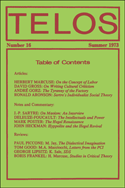 In his 1933 essay “On the Philosophical Foundation of the Concept of Labor in Economics,” Marcuse’s thesis is that the conception of labor as economic activity gives a one-sided picture of human praxis. According to Marcuse, such a conceptualization overlooks the way in which labor is an eternal condition of human existence geared toward self-creation and becoming. Marcuse’s elucidation of these issues invites contention. As Douglas Kellner asserts in his introduction to the essay, the two principal problems with Marcuse’s position pertain to the way in which labor is, on the one hand, presented as an entirely trans- or a-historical phenomenon, capable only of being “liberated” rather than offering the possibility of being “liberated from,” and, on the other, associated with an absolutized self through the process of labor-as-becoming, holding subjectivity to be forged consciously rather than foisted upon oneself from outside (Kellner, 3–6). To these I would add a related third, which is that an economic perspective such as that challenged by Marcuse is necessary to rectify the first and second stumbling blocks. In spite of this, as we shall see, Marcuse’s theorization of the philosophical and economic conceptualization of labor might provide useful insights for a rethink of productive activity in the context of contemporary capitalism. In his 1933 essay “On the Philosophical Foundation of the Concept of Labor in Economics,” Marcuse’s thesis is that the conception of labor as economic activity gives a one-sided picture of human praxis. According to Marcuse, such a conceptualization overlooks the way in which labor is an eternal condition of human existence geared toward self-creation and becoming. Marcuse’s elucidation of these issues invites contention. As Douglas Kellner asserts in his introduction to the essay, the two principal problems with Marcuse’s position pertain to the way in which labor is, on the one hand, presented as an entirely trans- or a-historical phenomenon, capable only of being “liberated” rather than offering the possibility of being “liberated from,” and, on the other, associated with an absolutized self through the process of labor-as-becoming, holding subjectivity to be forged consciously rather than foisted upon oneself from outside (Kellner, 3–6). To these I would add a related third, which is that an economic perspective such as that challenged by Marcuse is necessary to rectify the first and second stumbling blocks. In spite of this, as we shall see, Marcuse’s theorization of the philosophical and economic conceptualization of labor might provide useful insights for a rethink of productive activity in the context of contemporary capitalism.
Continue reading →
By Frederick H. Pitts · Tuesday, July 10, 2012 As an occasional feature on TELOSscope, we highlight a past Telos article whose critical insights continue to illuminate our thinking and challenge our assumptions. Today, Frederick H. Pitts looks at Salvatore Veca’s “Value, Labor, and the Critique of Political Economy” from Telos 9 (Fall 1971).
Capital is dead labor which, vampire-like, lives only by sucking living labor, and lives the more, the more labor it sucks.
—Karl Marx, Capital
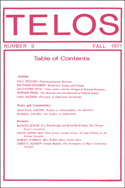 Salvatore Veca’s 1971 essay “Value, Labor, and the Critique of Political Economy” summarizes the treatment of contained and required labor in Adam Smith, David Ricardo, and Karl Marx. Most interesting is the manner in which Veca temporalizes this distinction in political economy. He draws our attention to the opposition between past labor and present, dead labor and living; namely, “the dominance of past, materialized, accumulated labor over immediate, living labor”: Salvatore Veca’s 1971 essay “Value, Labor, and the Critique of Political Economy” summarizes the treatment of contained and required labor in Adam Smith, David Ricardo, and Karl Marx. Most interesting is the manner in which Veca temporalizes this distinction in political economy. He draws our attention to the opposition between past labor and present, dead labor and living; namely, “the dominance of past, materialized, accumulated labor over immediate, living labor”:
Starting from the analysis of the typical character of labor, it is possible to reconstruct towards the surface of the system the progressive stratifications and determinations of a totality which must, however, be traced back to its base, i.e., to that unequal exchange which contaminates the world of commodities and which reveals the class violence, the elementary mechanism of exploitation, and the dominance of dead labor over living labor.
Veca presents the same temporal picture of past and present labor that moved Marx to crisscross Capital with a metaphorical cast of ghostly manifestations, vampires, and the undead. Veca’s paper suggests the extent to which Marx’s range of metaphors is no mere literary conceit, but rather it is a key feature of fundamental theoretical nodes in his critique of political economy. As we shall see, the specter of dead labor has deeper conceptual foundations in Marx’s forerunners, but this idea also has contemporary relevance with reference to present-day philosophical trends.
Continue reading →
By Frederick Wertz · Wednesday, July 4, 2012 As an occasional feature on TELOSscope, we highlight a past Telos article whose critical insights continue to illuminate our thinking and challenge our assumptions. Today, Frederick Wertz looks at Luigi Marco Bassani’s “Jefferson, Calhoun and States’ Rights: The Uneasy Europeanization of American Politics,” from Telos 114 (Winter 1999).
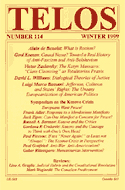 In an enlightening piece, Luigi Marco Bassani reopens the door on an all-too-closed chapter of American political discourse: states’ rights. He poses a question that he sees to be the crux of one of the most permanent issues in American history: “In 1776, did the thirteen colonies separate themselves from Great Britain collectively or singularly?” This question, regarding the role of the Federal government in American society, was the essence of American politics for nearly a century. Though political debate and war in the 19th century resulted in an irreversible consolidation of federal power, the issue still crops up in the American political ethos during times of crisis or extreme polarization. Bassani usefully highlights the two most important proponents of states’ rights, Thomas Jefferson and John C. Calhoun. In an enlightening piece, Luigi Marco Bassani reopens the door on an all-too-closed chapter of American political discourse: states’ rights. He poses a question that he sees to be the crux of one of the most permanent issues in American history: “In 1776, did the thirteen colonies separate themselves from Great Britain collectively or singularly?” This question, regarding the role of the Federal government in American society, was the essence of American politics for nearly a century. Though political debate and war in the 19th century resulted in an irreversible consolidation of federal power, the issue still crops up in the American political ethos during times of crisis or extreme polarization. Bassani usefully highlights the two most important proponents of states’ rights, Thomas Jefferson and John C. Calhoun.
Continue reading →
By Sunil Kumar · Tuesday, July 3, 2012 As an occasional feature on TELOSscope, we highlight a past Telos article whose critical insights continue to illuminate our thinking and challenge our assumptions. Today, Sunil Kumar looks at Theodor W. Adorno’s “The Stars Down to Earth: The Los Angeles Times Astrology Column,” from Telos 19 (Spring 1974).
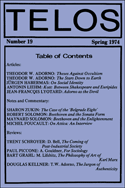 “The Stars Down to Earth” is the content analysis of an astrology column that Adorno wrote during a return visit to the United States from Germany in 1952–53 and appeared in translation in Telos in 1974. The column under scrutiny called, “Astrological Forecasts,” was written by Carroll Righter and appeared in the Los Angeles Times, described by Adorno as a conservative newspaper, leaning far to the right wing of the Republican Party. He engages in a detailed analysis of the column between November 1952 and February 1953. His method is that of the systematic construction of the imagined readers of the column and a critique of the ideology that the column reinforces, that of accepting the social system as fate. Adorno hypothesizes that columns such as these mold to some extent the reader’s thinking and foster an element of blind acceptance. The impetus of the piece, as in “The Thesis against Occultism” (1947), is to highlight the tendency toward irrationality and authoritarianism in mid-twentieth-century Western culture. In the analysis of the column, this irrationality is reflected by the readers’ acceptance of the column’s absurd claim to be inspired by the stars, and the need to look for guidance and succor in the advice of an expert authority on mundane matters. The stars stand in for the reader of the column as a source of authority, and the belief in astrology represents for him or her a belief in a higher order—one that also appears to present to events a veneer of rationality to its opaque origin. “The Stars Down to Earth” is the content analysis of an astrology column that Adorno wrote during a return visit to the United States from Germany in 1952–53 and appeared in translation in Telos in 1974. The column under scrutiny called, “Astrological Forecasts,” was written by Carroll Righter and appeared in the Los Angeles Times, described by Adorno as a conservative newspaper, leaning far to the right wing of the Republican Party. He engages in a detailed analysis of the column between November 1952 and February 1953. His method is that of the systematic construction of the imagined readers of the column and a critique of the ideology that the column reinforces, that of accepting the social system as fate. Adorno hypothesizes that columns such as these mold to some extent the reader’s thinking and foster an element of blind acceptance. The impetus of the piece, as in “The Thesis against Occultism” (1947), is to highlight the tendency toward irrationality and authoritarianism in mid-twentieth-century Western culture. In the analysis of the column, this irrationality is reflected by the readers’ acceptance of the column’s absurd claim to be inspired by the stars, and the need to look for guidance and succor in the advice of an expert authority on mundane matters. The stars stand in for the reader of the column as a source of authority, and the belief in astrology represents for him or her a belief in a higher order—one that also appears to present to events a veneer of rationality to its opaque origin.
Continue reading →
By Wes Tirey · Thursday, June 21, 2012 As an occasional feature on TELOSscope, we highlight a past Telos article whose critical insights continue to illuminate our thinking and challenge our assumptions. Today, Wes Tirey looks at Norberto Bobbio’s ” Democracy and Invisible Government,” from Telos 52 (Summer 1982).
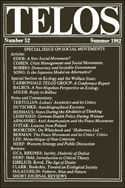 “Democracy,” writes Jacques Rancière in Hatred of Democracy, “first of all means this: ‘anarchic government,’ one based on nothing other than the absence of every title to govern.” He adds: “Democracy is . . . the primary limitation of the power of forms of authority that govern the social body.” While Rancière’s suggestion that democracy is ‘anarchic government’ indeed seems paradoxical, and by all means requires careful unpacking, one thing that can be taken from it is that democracy is to be seen. That is to say, a political regime that requires active citizen-participation in which the body politic is self-governing requires political activity to therefore be made public. “Democracy,” writes Jacques Rancière in Hatred of Democracy, “first of all means this: ‘anarchic government,’ one based on nothing other than the absence of every title to govern.” He adds: “Democracy is . . . the primary limitation of the power of forms of authority that govern the social body.” While Rancière’s suggestion that democracy is ‘anarchic government’ indeed seems paradoxical, and by all means requires careful unpacking, one thing that can be taken from it is that democracy is to be seen. That is to say, a political regime that requires active citizen-participation in which the body politic is self-governing requires political activity to therefore be made public.
Continue reading →
By Katherine McGinity · Wednesday, June 20, 2012 As an occasional feature on TELOSscope, we highlight a past Telos article whose critical insights continue to illuminate our thinking and challenge our assumptions. Today, Katherine McGinity looks at Jim Vernon’s “American Antigone: Hegelian Reflections on the Sheehan-Bush Conflict,” from Telos 144 (Fall 2008).
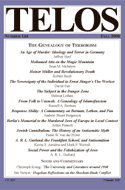 With the departure of the last American troops from Iraq, we can shift our perspective on the war from current event to one of history. Jim Vernon’s 2008 article “American Antigone: Hegelian Reflections on the Sheehan-Bush Conflict” was written in the midst of the war and just as Cindy Sheehan was moving herself out of the public eye. Now is an interesting time to revisit the dramatic conflict that ensued between Sheehan and George W. Bush and the ideological camps that formed around them. With the departure of the last American troops from Iraq, we can shift our perspective on the war from current event to one of history. Jim Vernon’s 2008 article “American Antigone: Hegelian Reflections on the Sheehan-Bush Conflict” was written in the midst of the war and just as Cindy Sheehan was moving herself out of the public eye. Now is an interesting time to revisit the dramatic conflict that ensued between Sheehan and George W. Bush and the ideological camps that formed around them.
Continue reading →
|
|
 In his 1933 essay “On the Philosophical Foundation of the Concept of Labor in Economics,” Marcuse’s thesis is that the conception of labor as economic activity gives a one-sided picture of human praxis. According to Marcuse, such a conceptualization overlooks the way in which labor is an eternal condition of human existence geared toward self-creation and becoming. Marcuse’s elucidation of these issues invites contention. As Douglas Kellner asserts in his introduction to the essay, the two principal problems with Marcuse’s position pertain to the way in which labor is, on the one hand, presented as an entirely trans- or a-historical phenomenon, capable only of being “liberated” rather than offering the possibility of being “liberated from,” and, on the other, associated with an absolutized self through the process of labor-as-becoming, holding subjectivity to be forged consciously rather than foisted upon oneself from outside (Kellner, 3–6). To these I would add a related third, which is that an economic perspective such as that challenged by Marcuse is necessary to rectify the first and second stumbling blocks. In spite of this, as we shall see, Marcuse’s theorization of the philosophical and economic conceptualization of labor might provide useful insights for a rethink of productive activity in the context of contemporary capitalism.
In his 1933 essay “On the Philosophical Foundation of the Concept of Labor in Economics,” Marcuse’s thesis is that the conception of labor as economic activity gives a one-sided picture of human praxis. According to Marcuse, such a conceptualization overlooks the way in which labor is an eternal condition of human existence geared toward self-creation and becoming. Marcuse’s elucidation of these issues invites contention. As Douglas Kellner asserts in his introduction to the essay, the two principal problems with Marcuse’s position pertain to the way in which labor is, on the one hand, presented as an entirely trans- or a-historical phenomenon, capable only of being “liberated” rather than offering the possibility of being “liberated from,” and, on the other, associated with an absolutized self through the process of labor-as-becoming, holding subjectivity to be forged consciously rather than foisted upon oneself from outside (Kellner, 3–6). To these I would add a related third, which is that an economic perspective such as that challenged by Marcuse is necessary to rectify the first and second stumbling blocks. In spite of this, as we shall see, Marcuse’s theorization of the philosophical and economic conceptualization of labor might provide useful insights for a rethink of productive activity in the context of contemporary capitalism.  Salvatore Veca’s 1971 essay “Value, Labor, and the Critique of Political Economy” summarizes the treatment of contained and required labor in Adam Smith, David Ricardo, and Karl Marx. Most interesting is the manner in which Veca temporalizes this distinction in political economy. He draws our attention to the opposition between past labor and present, dead labor and living; namely, “the dominance of past, materialized, accumulated labor over immediate, living labor”:
Salvatore Veca’s 1971 essay “Value, Labor, and the Critique of Political Economy” summarizes the treatment of contained and required labor in Adam Smith, David Ricardo, and Karl Marx. Most interesting is the manner in which Veca temporalizes this distinction in political economy. He draws our attention to the opposition between past labor and present, dead labor and living; namely, “the dominance of past, materialized, accumulated labor over immediate, living labor”:  In an enlightening piece, Luigi Marco Bassani reopens the door on an all-too-closed chapter of American political discourse: states’ rights. He poses a question that he sees to be the crux of one of the most permanent issues in American history: “In 1776, did the thirteen colonies separate themselves from Great Britain collectively or singularly?” This question, regarding the role of the Federal government in American society, was the essence of American politics for nearly a century. Though political debate and war in the 19th century resulted in an irreversible consolidation of federal power, the issue still crops up in the American political ethos during times of crisis or extreme polarization. Bassani usefully highlights the two most important proponents of states’ rights, Thomas Jefferson and John C. Calhoun.
In an enlightening piece, Luigi Marco Bassani reopens the door on an all-too-closed chapter of American political discourse: states’ rights. He poses a question that he sees to be the crux of one of the most permanent issues in American history: “In 1776, did the thirteen colonies separate themselves from Great Britain collectively or singularly?” This question, regarding the role of the Federal government in American society, was the essence of American politics for nearly a century. Though political debate and war in the 19th century resulted in an irreversible consolidation of federal power, the issue still crops up in the American political ethos during times of crisis or extreme polarization. Bassani usefully highlights the two most important proponents of states’ rights, Thomas Jefferson and John C. Calhoun.  “The Stars Down to Earth” is the content analysis of an astrology column that Adorno wrote during a return visit to the United States from Germany in 1952–53 and appeared in translation in Telos in 1974. The column under scrutiny called, “Astrological Forecasts,” was written by Carroll Righter and appeared in the Los Angeles Times, described by Adorno as a conservative newspaper, leaning far to the right wing of the Republican Party. He engages in a detailed analysis of the column between November 1952 and February 1953. His method is that of the systematic construction of the imagined readers of the column and a critique of the ideology that the column reinforces, that of accepting the social system as fate. Adorno hypothesizes that columns such as these mold to some extent the reader’s thinking and foster an element of blind acceptance. The impetus of the piece, as in “The Thesis against Occultism” (1947), is to highlight the tendency toward irrationality and authoritarianism in mid-twentieth-century Western culture. In the analysis of the column, this irrationality is reflected by the readers’ acceptance of the column’s absurd claim to be inspired by the stars, and the need to look for guidance and succor in the advice of an expert authority on mundane matters. The stars stand in for the reader of the column as a source of authority, and the belief in astrology represents for him or her a belief in a higher order—one that also appears to present to events a veneer of rationality to its opaque origin.
“The Stars Down to Earth” is the content analysis of an astrology column that Adorno wrote during a return visit to the United States from Germany in 1952–53 and appeared in translation in Telos in 1974. The column under scrutiny called, “Astrological Forecasts,” was written by Carroll Righter and appeared in the Los Angeles Times, described by Adorno as a conservative newspaper, leaning far to the right wing of the Republican Party. He engages in a detailed analysis of the column between November 1952 and February 1953. His method is that of the systematic construction of the imagined readers of the column and a critique of the ideology that the column reinforces, that of accepting the social system as fate. Adorno hypothesizes that columns such as these mold to some extent the reader’s thinking and foster an element of blind acceptance. The impetus of the piece, as in “The Thesis against Occultism” (1947), is to highlight the tendency toward irrationality and authoritarianism in mid-twentieth-century Western culture. In the analysis of the column, this irrationality is reflected by the readers’ acceptance of the column’s absurd claim to be inspired by the stars, and the need to look for guidance and succor in the advice of an expert authority on mundane matters. The stars stand in for the reader of the column as a source of authority, and the belief in astrology represents for him or her a belief in a higher order—one that also appears to present to events a veneer of rationality to its opaque origin.  “Democracy,” writes Jacques Rancière in Hatred of Democracy, “first of all means this: ‘anarchic government,’ one based on nothing other than the absence of every title to govern.” He adds: “Democracy is . . . the primary limitation of the power of forms of authority that govern the social body.” While Rancière’s suggestion that democracy is ‘anarchic government’ indeed seems paradoxical, and by all means requires careful unpacking, one thing that can be taken from it is that democracy is to be seen. That is to say, a political regime that requires active citizen-participation in which the body politic is self-governing requires political activity to therefore be made public.
“Democracy,” writes Jacques Rancière in Hatred of Democracy, “first of all means this: ‘anarchic government,’ one based on nothing other than the absence of every title to govern.” He adds: “Democracy is . . . the primary limitation of the power of forms of authority that govern the social body.” While Rancière’s suggestion that democracy is ‘anarchic government’ indeed seems paradoxical, and by all means requires careful unpacking, one thing that can be taken from it is that democracy is to be seen. That is to say, a political regime that requires active citizen-participation in which the body politic is self-governing requires political activity to therefore be made public.  With the departure of the last American troops from Iraq, we can shift our perspective on the war from current event to one of history. Jim Vernon’s 2008 article “American Antigone: Hegelian Reflections on the Sheehan-Bush Conflict” was written in the midst of the war and just as Cindy Sheehan was moving herself out of the public eye. Now is an interesting time to revisit the dramatic conflict that ensued between Sheehan and George W. Bush and the ideological camps that formed around them.
With the departure of the last American troops from Iraq, we can shift our perspective on the war from current event to one of history. Jim Vernon’s 2008 article “American Antigone: Hegelian Reflections on the Sheehan-Bush Conflict” was written in the midst of the war and just as Cindy Sheehan was moving herself out of the public eye. Now is an interesting time to revisit the dramatic conflict that ensued between Sheehan and George W. Bush and the ideological camps that formed around them. 

